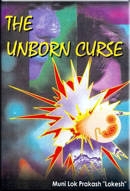
A Word From Dr. N.P. Jain, IFS (Retd.)
Former Secretary, Ministry of External Affairs, Government of India and India's Ambassador to Nepal, E.U., Mexico, Belgium and U.N.
I have enjoyed translating into English this very thought-provoking novel by Muni Shri Lokprakashji "Lokesh" on the burning social issue of foeticide. It has been a labour of love and learning. Indeed I got so absorbed in the beautifully woven story that I set aside all my other work to complete it. What has given me satisfaction is that through its English rendering, the novel would reach a much wider circle of society in India and abroad.
The novel is a persuasive as well as a pressing call to the civilized society to bid farewell to such an utterly inhuman, despicable and revoltingly cruel practice, which destroys a living soul in its embryo. It is a merciless violation of the much-talked-about "Right to life". The novel challenges the mentality which looks upon the fernale embryo as an 'unborn curse'.
The striking thing about the novel is its imaginative treatment of the therne through a human story of ajoint family in a way as to show the desirability of tackling it boldly and persuasively with a non-violent approach. By bringing in the elements of voluntary repentance, seeking forgiveness and giving forgiveness, Muni Shri Lokeshji has lifted the theme to higher philosophical levels in a very practical ambience.
The characterization of Prabha aunty and Sukanya Bhuaji - the two villains of the story is remarkable in its mixture of their bold and frank criticism by the young members of the family but always with due respect and a persuasive effort to make them realise their mistake and voluntarily repent for it. Forgiveness sought with a repentant heart emerges in the novel as a potent instrument of healthy ethical transformation. This is very delicately reflected in the characters of Vishakha and Jyoti - the two young ladies who were pressurized into committing abortion. They find solace in the forgiveness given to them and rational understanding shown by the family elders and succeed in getting over their mental stress and emotional shock for shaping a better tomorrow in their lives. The vigour of the enlightened young team of Akhil, Vipin, Kunal and Jatin in raising their voice against female foeticide is admirable and inspiring.
The novel should act as a catalyst for arousing social conscience so that people move away voluntarily from such evils with a change of heart. Reforms can not become effective only through legislation unless the call for change awakens the collective will of the society for promoting "Reverence for all life".
Dr. Narendra P. Jain
 Dr. Narendra P. Jain
Dr. Narendra P. Jain